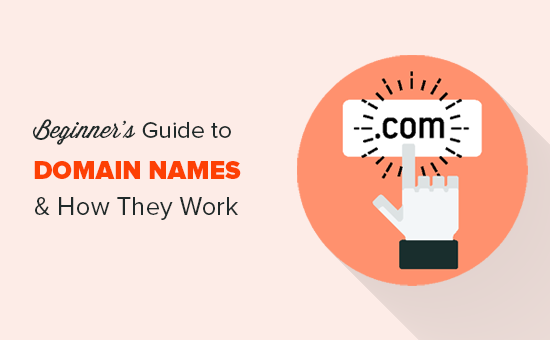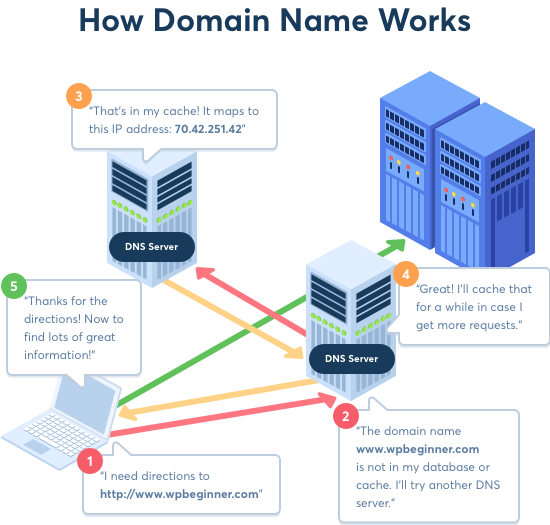Have you ever wondered what the difference is between .com vs .net domain name extensions? Choosing the right domain name is crucial because it can have an impact on your branding and search rankings.
In this article, we will explain the difference between .com vs .net domain extensions and which one is better for your website.
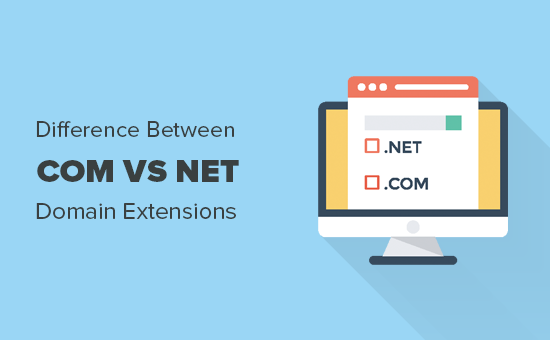
What Are .Com and .Net Domain Name Extensions?
A domain name is your website’s address on the internet. Ours is wpbeginner.com.
To learn more about domain names, see our beginner’s guide on what is a domain name and how do domains work.
Domain names always have an extension. This is sometimes also called a TLD, which stands for Top Level Domain. For instance:
example.com
example.net
example.org
You can choose from a wide range of domain extensions when making your website.
Most domain extensions don’t have any restrictions on usage and lots of new domain extensions have been created in recent years.
However, extensions were originally created for different types of websites. They have specific meanings.
You need to choose a domain name extension that fits your business while helping you build a recognizable brand in your industry.
Let’s take a look at the difference between the most popular .com vs .net domain extensions to see which is better for your business.
Difference Between .Com vs .Net Domain Names
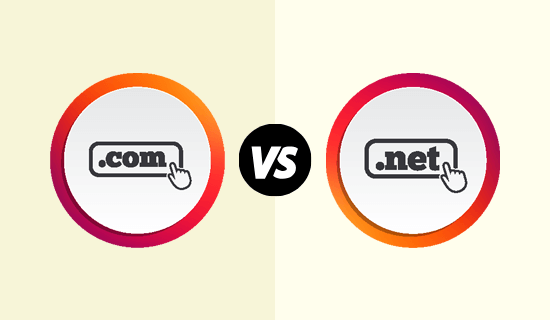
Com and Net are two of the most popular domain name extensions. If your preferred .com domain name extension is not available, then you might be tempted to use a .net instead.
However, .net isn’t a good option for your business in most cases.
The “com” in the .com domain name indicates a “commercial” site. This can cover business websites, websites that want to make money online, personal websites, blogs, portfolios, and more.
On the other hand, the “net” in the .net domain name extension stands for “network”. It was designed for the internet, networking, and email service providers.
If you’re wondering about .org, that stands for “organization” and was originally intended for use by nonprofit organizations.
When Should You Choose a .Com Domain Name?

The .com domain extension has been synonymous with the internet since the “dot-com bubble” in the late 1990s. Over 40% of all registered domain names are .com domains.
It’s much easier for people to remember a .com domain name than any other domain extension. It’s familiar and reassuring, plus it makes your site look professional.
Also, most mobile keyboards have a dedicated .com button. You won’t find that for .net (or any other extension).
There’s just one problem. You’ve probably noticed that .com domain names are so popular that it feels like all the good ones are already taken!
However, there are still plenty of clever ways to get the perfect .com domain name. Here are some things to try:
- Check that your domain name represents your business and what you do. For example, stargardeningservices.com is better than starservices.com.
- If your preferred domain name is taken, then you can add a word before or after it to make it unique. Your location could work well here. For example, stargardeninghouston.com.
- Make sure your domain name can be easily pronounced and remembered. Don’t use hyphens or numbers in your domain name.
- Take advantage of online domain name generators. These free tools will help you come up with clever domain name ideas that are unique and still available. WPBeginner now has an AI-powered free business name generator.
Need more help? We’ve got lots of practical tips and real-life examples in our article on how to choose the best domain name for your website.
When You Should Use the .Net Domain Extension?
The .net extension still makes sense in some cases. You could use it if you offer internet, networking, database hosting, email hosting, or similar services.
You might even want to use a .net domain name if it truly suits your brand.
For example, Behance.net is a popular online design community which uses a .net domain extension for their website. It suits them because they wanted to be a network of artists, designers, and companies looking for talent.
Under 4% of all domain names registered are using the .net domain extension.
Why You Might Be Tempted to Use the .Net Extension
Have you ever tried to register a .com domain and seen something like this?
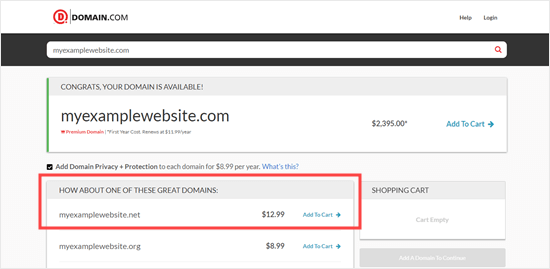
Domain name registrars often present .net as the top alternative to .com. This might make you think it’s more commonly used than it actually is.
Even the most well-known internet and network service companies use a .com domain name for their business.
Of course, 4% is still a lot of domain names. Over 13 million, in fact. You might wonder who’s using all those .net domain names.
In many cases, the .net domains aren’t really being used.
Many businesses register a .net extension so no-one else can take it. They may not use the .net domain, or they may redirect it to their .com. site.
Also, some companies started with a .net because they couldn’t get the .com they wanted. Most later transferred to a .com domain extension, often keeping the .net domain name registered for technical and legal reasons.
Choosing .Com vs .Net – Which One is Better for SEO?

A lot of our users ask us which domain extension will help them rank higher.
If you’re looking at either .com or .net, it doesn’t make any difference which you choose from an SEO perspective. Search engines will treat both domain extensions the same.
Just focus on SEO best practices and create useful targeted content to rank higher.
The important part is your domain name itself, not the extension.
For example, stargardeningservices.com will rank better than starservices.net because it contains a keyword (gardening services) that people are likely to search for.
How to Buy a Domain Name
There are two ways to get a domain name. You can choose the one that best suits you.
1. Get a FREE Domain Name with Bluehost
To make a website, you need website hosting as well as a domain name.
This may seem a bit confusing when you’re new to creating websites. Make sure you’re clear on the difference between domain name and website hosting.
Usually, you will pay around $14.99/year for a domain name and $7.99/month for hosting. If you are just starting out, then you may feel that’s quite expensive.
Luckily, the folks at Bluehost are offering WPBeginner users a free domain name and a 65% discount on hosting.
→ Click Here to Claim Your Free Domain Name ←
2. Register a Domain Name
If you don’t want to make a website straight away, you can still register a domain name and make a website later.
We recommend using Domain.com for this. They offer features like private registration, easy transfers, easy DNS management, and more. Their search tool shows you premium domains as well as regular ones, too.
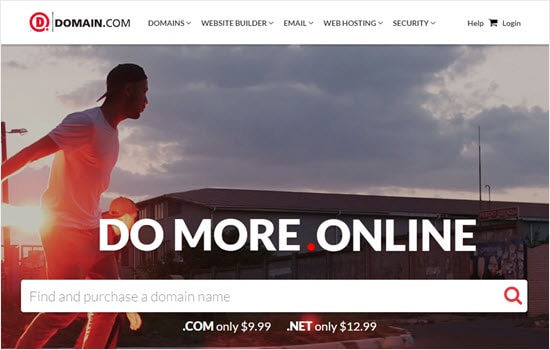
To get an exclusive 25% discount on your domain, make sure you go through our link to Domain.com. This will automatically apply our Domain.com coupon code.
If you’re looking for Domain.com alternatives, then please see our list of the best domain registrars.
If this is your first time registering a domain name, then you may want to use our step by step guide on how to register a domain name.
We hope this article helped you learn the difference between .com vs .net domain name extensions. You may also want to see our step by step guides on how to start a blog and how to start an online store.
If you liked this article, then please subscribe to our YouTube Channel for WordPress video tutorials. You can also find us on Twitter and Facebook.
The post Com vs Net – What’s the Difference Between Domain Extensions appeared first on WPBeginner.


